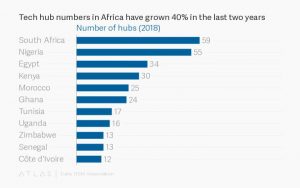The technology revolution has really taken Africa by storm. With more and more people getting connected, it is no surprise giant tech companies want to increase investment in African economies. In June 2018, Google announced a decision to open an AI Research Lab in Accra, Ghana. With similar AI Labs already open in China and France, this was the first time Google had started a project of this scale in Africa. It was announced that the Accra AI lab would, “look for ways to produce state-of-the-art models and would partner with regional institutions like the African Institute of Mathematical Sciences (AIMS).” With the lab focusing on medical diagnosis, treatment and also understanding of machine learning models, Dr Moustapha Cisse was tasked with leading the Accra lab. His work history includes working at Facebook AI Research and also being the founder of the organization Black in AI. With Ghana rated one of the fastest growing economies in Africa, as of 2018, it had 24 tech hubs and incubator spaces and the number keeps increasing. Across Africa, in general as well, the number of hubs is increasing. In 2016, the continent had 314 spaces, and by 2018, 442. As more businesses look to set up hubs in our continent, governments should make every effort to ensure that local talent is at the core of these businesses.

Source: ATLAS
Providing these spaces where people are able to learn to code, work remotely and access the internet whilst working on digital skills will help bridge the digital divide across the continent. It will allow for more indigenous talent to flourish and provide solutions to some of Africa’s problems. As more foreign businesses are looking to open up in Africa, governments need to be doing more to ensure our talent has space to develop and opportunities that will benefit our communities, especially the youth are created.
Youth unemployment across Africa is high, with many graduates struggling to find jobs. According to the World Bank, 60% of the unemployed in Africa are youth (aged between 15–24). Data from the African Development Bank, unfortunately, shows how young women are unfairly disadvantaged compared to young men when looking for work, even with the same skillset and qualifications. Countries like Ghana and Zambia have created a national youth service and youth empowerment programs to help graduates build life skills that will aid them to find jobs. Mauritius offers the Technical and vocational education and training (TVET) initiative to under 16s to help provide options for career development for school leavers. Schemes similar to these need to become common across the continent. The youth are the future of the continent and we need to ensure they are empowered. As more companies look to invest in Africa, we as a continent need to ensure we have the talent pool and skilled labour needed to fill the new roles. The African Union (AU) should encourage and also aid intra-governmental organisations to prioritise opportunities for growth and youth empowerment.
The African Union and its role on the continent
“A United and Strong Africa”
Intra-governmental organisations (IGOs) are composed primarily of sovereign states and are established usually by a treaty that acts as a charter governing the member states. The African Union consists of all 55 African states and aims to achieve greater unity and solidarity between the African countries and African citizens. The AU recognizes regional economic communities (RECs) which are composed of countries that are in close proximity to each other and were established under separate treaties. They are:
- Arab Maghreb Union (UMA)
- Common Market for Eastern and Southern Africa (COMESA)
- Community of Sahel-Saharan States (CEN-SAD)
- East African Community (EAC)
- Economic Community of Central African States (ECCAS)
- Economic Community of West African States (ECOWAS)
- Intergovernmental Authority on Development (IGAD)
- Southern African Development Community (SADC)
What are the benefits of regional communities?
Over the years, ECOWAS, SADC and EAC have been the most active RECs, attempting to implement policies towards free trade, relaxation of visa restrictions and providing military support during periods of uncertainty. With the problem of youth unemployment and the development of talent in Africa, the AU needs to do more in ensuring the RECs are providing solutions to the unemployment crises affecting most of the 55 member states in the AU. Recently, RECs have been implementing relaxed visa policies across member states. For example, nationals from SADC countries can visit the 15 member states (Angola, Botswana, Comoros, DRC, eSwatini (Swaziland), Lesotho, Madagascar, Malawi, Mauritius, Namibia, Seychelles, South Africa, Tanzania, Zambia & Zimbabwe) with relative ease due to relaxed visa conditions such as Visa on arrival. As more tech spaces open across the SADC region, countries should be looking to capitalise on attracting the best talent across their region. This includes tapping into the REC networks, promoting opportunities for migrant workers and working with neighbouring countries to provide better travel links.
Whilst some problems in Africa are common, most nations are solving these problems differently, by allowing workers to move across the region, it will increase the diversity within teams and offer better solutions to problems. Though a tourist visa is granted on arrival, across SADC, work visas remain difficult to obtain or have strict restrictions, with many companies often opting not to fund or support them.
How do we solve this problem?
In the same news cycle of Googles decision to open an AI lab in Ghana, there was also news about Betelehm Dessie, a young pioneer in AI from Ethiopia’s emerging tech scene, often referred to as ‘Sheba Valley.’ Her story is inspiring. At 19 she has been coordinating a number of nationwide programs run by robotics lab iCog (one of the AI labs involved in developing Sophia the robot). Already Betelehm has four software programs copyrighted to her name, with the Ethiopian government listed as one of her clients after she developed an app to map rivers used for irrigation. Her expertise in the AI space will benefit Ethiopia and the communities she is working with. However, as businesses such as Google open spaces in other countries, how can they tap into Ethiopia’s ‘Sheba Valley’? Ethiopia has taken the first step of ensuring all African citizens are able to gain a visa on arrival, which will boost cross-border tourism, trade and investment. Historically, Ethiopia has been part of the African Union (AU) and COMESA (Common Market for Eastern and Southern Africa) but not part of the REC, East African Community. As RECs tend to be more welcoming of other member states, it has historically been easier for workers to navigate their regional community. Remote working is always an option, but how we can we help our entrepreneurs navigate across the region for work? This is where I believe the problem can and should be solved by a more tolerant approach to migration.
What needs to be done
Free trade across Africa is something the AU has been trying to implement without success. Recently at the African Continental Free Trade Agreement (AfCFTA) summit, Nigeria was one of 2 nations out of 55 to withdraw and not sign up to the agreement. The aim was to create a single continental market for goods and services, with free movement of business persons and investments. It has proven to be difficult to get all 55 nations to agree to the terms, but regionally, it will be far easier for SADC, ECOWAS and other nations to successfully adopt these policies. This will create opportunities within our communities. It will help boost our economies, and for our people, it will give them a chance to tour their regions. When in the future the entire AU agrees to adopt AfCFTA, our RECs must boast as being the drivers of the process. It will be a collaborative effort to get to a point where Africans are able to migrate freely across the regions. As more opportunities open up across the region, especially with the levels of Chinese investment in infrastructure the continent is receiving, more efforts by governments towards the training of relevant skills such as civil engineers, architects and the building of vocational skills will benefit the continent.
The views expressed in this article are those of the author alone and not the Future Africa Forum.
The views expressed in this article are those of the author and do not necessarily reflect the views of Future Africa Forum. Future Africa Forum is a pan-African policy think-tank and policy advisory consultancy headquartered in Nairobi, Kenya.


